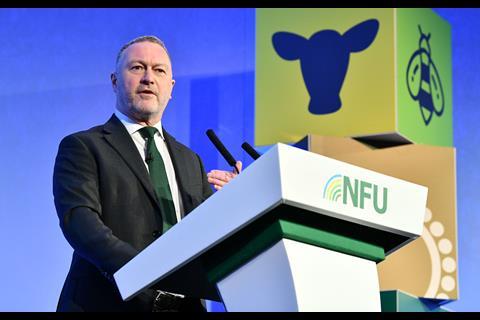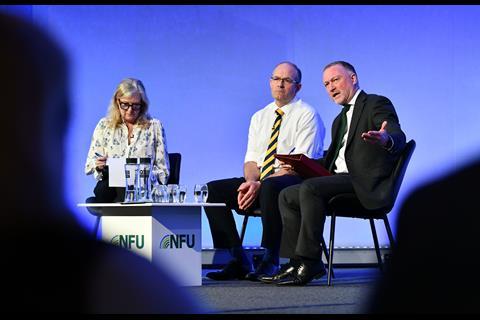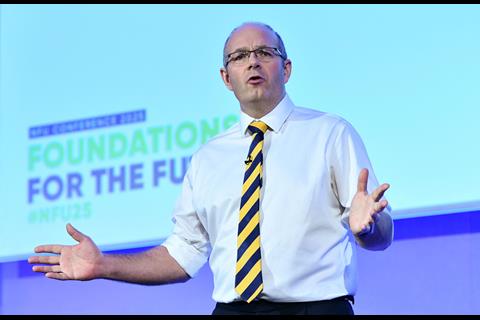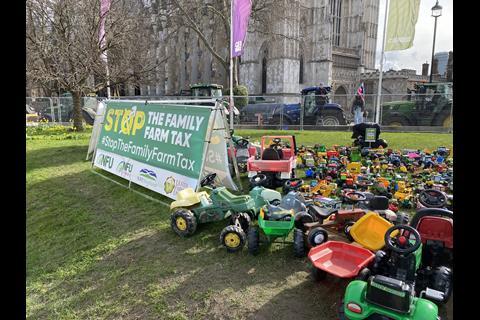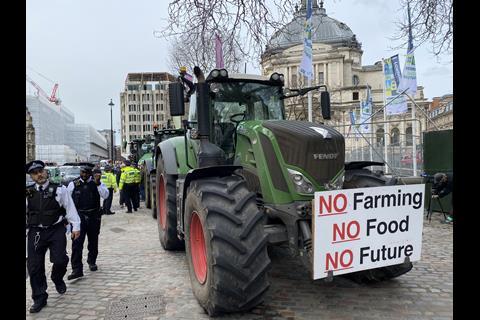Under-fire Defra secretary announces measures to boost farmers’ profitability but refuses to budge on inheritance tax and caveats seasonal worker extension with intention to reduce visa numbers in future
Inheritance Tax was unsurprisingly the hot topic at the NFU Conference in London as farmers continued to protest the changes and voice their anger and frustration.
Defra secretary Steve Reed’s speech was interrupted by protestors inside and outside the Queen Elizabeth II Conference Centre on 25 February. Banners were unfurled in front of Reed during his speech, he was heckled by members of the audience, and farmers continuously honked the horns of their tractors parked in front of the venue.
Family Farm Tax
NFU president Tom Bradshaw reiterated his position that that the so-called Family Farm Tax is “morally wrong because of the real, human impact it’s having”.
He added that “many older farmers are now facing the very real dilemma that, unless they die before April 2026, their children will face a Family Farm Tax bill they simply don’t make enough money to pay”.
Bradshaw stressed that the Family Farm Tax also makes little economic sense, pointing to the CBI’s warning that thousands of farmers could face being forced to sell land or assets to cover the new costs.
Before the Autumn Budget, farmers were able to claim 100 per cent relief from inheritance tax on agricultural land. But from April 2026 they will have to pay the tax on the value of land above £1m at a rate of 20 per cent.
“Any growth plan will tumble; any industrial strategy will fall flat at the first hurdle… if we don’t first back our foundational sectors,” CBI chief executive Rain Newton-Smith warned in a session on skills and investment at the conference.
The government has previously said the changes will only impact around 500 farms a year, but the NFU estimates that over three-quarters of working farms are likely to fall above the £1m threshold.
Bradshaw last week proposed an alternative: levying the tax only if farm assets are sold within seven years of the owner’s death. The NFU argues this would protect farmers from punitive taxes on illiquid assets.
However, The NFU’s alternative plan was dismissed. And Bradshaw pledged to continue fighting the Family Farm Tax “until ministers do the right thing”.
“We will not stop, we will not give in,” he told the audience of farmers in London.
But speaking to journalists after the speech, Bradshaw ruled out the possibility of farmers becoming more militant in their protests. “We can’t jeopardise public support,” he explained.
During his speech, Reed struck an apologetic tone, saying “sorry” a number of times for the “shock” the inheritance tax changes have created across the sector.
He stressed his respect for the NFU and British farming, but said he could not give farmers the answer they were looking for on the tax.
Profitability pledges
In an apparent effort to placate British farmers, Reed instead announced the formation of a ‘farming profitability unit’ to help secure the long-term viability of the agricultural sector.
However, Bradshaw stressed that the inheritance tax issue “overshadows everything” because it makes it impossible to plan ahead and make the long-term investments required.
Nevertheless, Reed announced a number of policy pledges he said would aid profitability, including a £110mn Farming Innovation Programme to support R&D in agritech, and a promise to protect UK farmers in future trade deals by protecting environmental and animal welfare standards.
Reed also restated the government’s commitment to helping make supply chains fairer. New rules for the pig sector will come in this spring to ensure that supply contracts clearly set out expectations and changes can only be made if agreed by all parties.
Similar regulations for the fresh produce sector, as well as eggs, are set to follow.
Furthermore, the Defra secretary announced that the legislation to implement the Precision Breeding Act for gene-edited plants in England had been laid in Parliament. And he confirmed that the government will reopen the ELM capital grants offer this summer.
Seasonal worker visas
Perhaps the biggest announcement for the fresh produce sector was a five-year extension to the seasonal worker scheme.
In a press conference following the Reed’s speech, Bradshaw hailed the extension as a win for the industry – but the announcement came with a caveat: that quotas will be reviewed annually, and visa numbers will be reduced in future as the industry develops agritech to reduce its reliance on seasonal labour.
“We all know the seasonal workers scheme does not lead to immigration, but immigration is such a political topic today, so I think the narrative around the announcement is what everyone had to expect.
“We’re going to be in a position where we’re still fighting annually for the number of visas offered. But there was no talk about growth of the horticulture sector, which has some of the biggest potential for growth.
“You’re not going to grow a sector with fewer workers, so we need to start looking at the output per hour worked. If we start improving that output, then it means the sector is becoming more productive. This should be the justification for keeping the numbers at the same level or even increasing them in future.”
Public procurement
On the issue of public procurement, the Defra secretary announced “new requirements for government catering contracts to favour high-quality, high-welfare products that local farms and producers are well placed to serve”. However, Bradshaw pointed out that there was no specific commitment for this food to be British.
“All too often, public procurement is not profitable,” he said. “Everyone involved in public procurement would say that unfortunately the budgets are so pressurised that it’s a case of what you can buy, and if you can buy it, rather than where you get it from.
“The government is going to have to transform the whole public procurement model, and, I believe, invest to make sure they are able to source more British ingredients.
“For years, public procurement has been underinvested, and the government now has some big decisions to make.”
